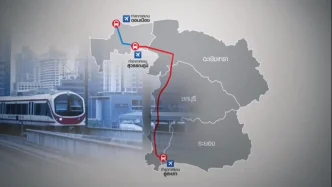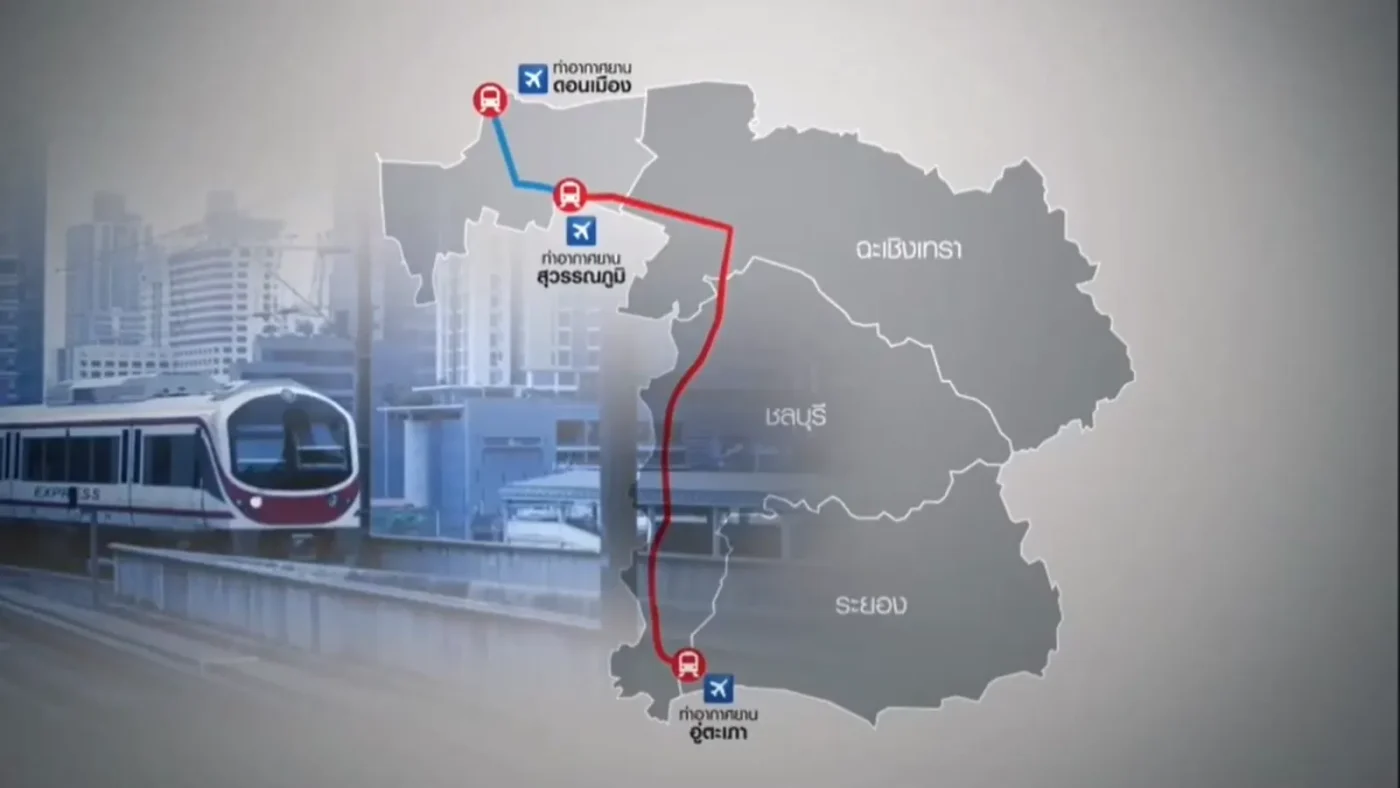Thailand’s ambitious high-speed rail project, connecting Don Mueang, Suvarnabhumi, and U-Tapao airports, is poised to finalize its contract in July after years of delays. Valued at 224 billion THB (6.85 billion USD), the 220km rail line will transform travel across Thailand, cutting journey times, fostering economic development, and enhancing the country’s appeal as a global tourism destination. For Thai citizens, the project promises thousands of jobs, improved connectivity, and economic opportunities in the eastern provinces. For tourists, it offers seamless airport transfers and easier access to coastal destinations like Pattaya and Rayong.
The project is owned by the State Railway of Thailand (SRT), with Asia Era One, a consortium led by the Charoen Pokphand Group, holding a 50-year concession to operate the rail. Chula Sukmanop, secretary-general of the Eastern Economic Corridor (EEC) Policy Committee, told Thansettakij that the contract is currently under review by the Office of the Attorney General, a process expected to conclude by mid-June. The revised agreement will then be submitted to the Civil Service Commission and the Cabinet for approval, with signing anticipated in July.
Economic and social benefits for Thailand
The high-speed rail is a flagship project of the EEC, a government initiative to transform Chonburi, Rayong, and Chachoengsao into a hub for high-tech industries and tourism. By linking Bangkok with the eastern seaboard, the rail will reduce travel time between Don Mueang and U-Tapao from over two hours by road to under an hour. This improved connectivity will enable residents of Rayong and Chonburi to access job opportunities in Bangkok or at the expanding U-Tapao airport, which is being developed as a major aviation hub. The EEC estimates the project will create 16,000 jobs during construction and 1,700 permanent positions once operational, injecting significant income into local communities.
The long-awaited high-speed rail linking Bangkok’s Don Mueang, Suvarnabhumi, and U-Tapao airports is set to finalize its contract in July, promising faster travel, economic growth, and a new era for Thailand’s tourism industry.
Beyond job creation, the rail will drive economic growth by attracting investment in sectors like aviation, logistics, and technology. Small businesses, from guesthouses in Pattaya to street food stalls in Rayong, are expected to benefit from increased visitor numbers and improved access. The SRT has structured the project to ensure public benefits, adopting a “build-as-you-pay” model where the state retains ownership of all infrastructure. Asia Era One, the private contractor, is responsible for significant financial commitments, including guarantees totaling 152.16 billion THB (4.65 billion USD) to ensure the project’s completion within five years.
A game-changer for tourists
For Thailand’s 36 million annual tourists, as reported by the Tourism Authority of Thailand in 2024, the high-speed rail will revolutionize travel. Currently, moving between Bangkok’s airports and coastal destinations like Pattaya involves navigating congested roads or limited public transport options. The rail will offer a fast, air-conditioned alternative, with estimated one-way fares of 400-600 THB (12.24-18.36 USD), based on similar rail systems in the region. This affordability and convenience will make day trips from Bangkok to Pattaya or Rayong more appealing, encouraging tourists to explore beyond the capital.
The rail will also enhance access to the eastern seaboard, where U-Tapao’s expansion as an international airport is set to draw more visitors to attractions like Pattaya’s beaches, Rayong’s golf courses, and cultural sites such as Wat Khao Phra Bat. Posts on X reflect enthusiasm among travelers for faster airport connections, with some comparing the project to Japan’s efficient Shinkansen. However, concerns about construction disruptions in Chonburi highlight the need for careful planning to minimize local impact.
Contract details and financial safeguards
The revised contract, approved by the SRT Board on March 27, includes several key provisions to ensure the project’s success. Asia Era One will pay 10.67 billion THB (326.5 million USD) for Airport Rail Link (ARL) management rights over seven annual instalments, starting with 1.5 billion THB (45.9 million USD) upon signing. The agreement adjusts the public investment cost payment structure, limiting state payments to 120 billion THB (3.67 billion USD) based on construction progress, with ownership of assets gradually transferred to the SRT. If Asia Era One’s financial returns exceed a 5.52% internal rate of return, the SRT can negotiate additional revenue sharing to benefit the public.
To mitigate risks, the contract includes financial guarantees totaling 160 billion THB (4.89 billion USD), due within 270 days of signing, comprising:
- Civil works construction guarantee: 125.93 billion THB (3.85 billion USD)
- System installation guarantee: 14.81 billion THB (453.2 million USD)
- Operational quality assurance guarantee: 748.25 million THB (22.9 million USD)
- ARL management rights guarantee: 10.67 billion THB (326.5 million USD)
The agreement also waives certain preconditions, such as investment promotion certificates, allowing the SRT to issue a notice to proceed immediately after signing. This will accelerate construction, particularly at U-Tapao, where infrastructure overlaps with the Thai-Chinese high-speed rail project. Revised clauses for force majeure and relief events align with other public-private partnerships, ensuring financial stability.
Challenges and outlook
While the project holds immense promise, challenges remain. Coordinating construction across busy airport zones and ensuring completion within five years will require close collaboration between the SRT and Asia Era One. Public concerns about disruptions underscore the importance of transparent communication and efficient management and while that needs to be managed by the appropriate groups and individuals the launch of this project is a success for the Thai Government.
The upshot of this is that the high-speed rail, valued at 224 billion THB (6.85 billion USD), will cut travel times, create 16,000 construction jobs and 1,700 permanent roles, and drive economic growth in the Eastern Economic Corridor. For tourists, affordable fares of 400-600 THB (12.24-18.36 USD) will make exploring Pattaya and Rayong easier, cementing Thailand’s status as a top travel destination. Backed by 160 billion THB (4.89 billion USD) in financial guarantees, the project is poised for success, despite construction challenges.
















